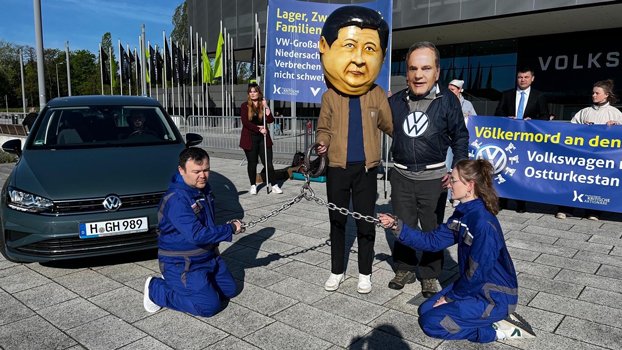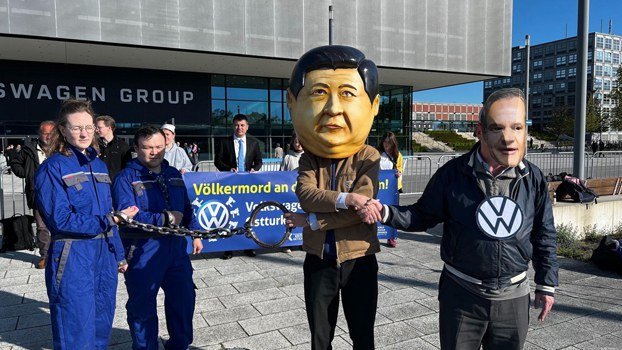
Throwing cake and impersonating Chinese President Xi Jinping, activists staged protests inside and outside Volkswagen’s shareholder meeting on Wednesday over the German carmaker’s alleged use of Uyghur forced labor in Xinjiang, where it has a joint venture plant.
Outside the hall, activists wore a big-headed mask of Xi and a flat paper mask of Volkswagen CEO Oliver Blume, who stood arm-in-arm. The Xi figure held a metal ring attached to a chain leading to two handcuffed people representing Uyghur workers in blue laborer uniforms.
Standing behind them, activists with the World Uyghur Congress held up big signs saying, “Camps, forced labor, family separations: VW major shareholders in Lower Saxony must not remain silent about crimes against Uyghurs,” a reference to the location of Volkswagen’s headquarters.
“Genocide of Uyghurs! VW has to withdraw from East Turkistan!” said another sign, a reference to the name Uyghurs call their homeland in modern-day Xinjiang.
Inside the exhibit hall where shareholders gathered, other protesters – including one woman who was topless and had “dirty money” painted on her back – shouted at executives and waved a banner that said, “End Uyghur Forced Labor,” according to Reuters. Others activists expressed concerns about climate change.
At one point, an activist hurled a cake toward company executives, one of whom was speaking on the podium, video shows.
After the disruption, security personnel escorted the activists out of the auditorium.
Controversial joint venture
The activists are upset that Volkswagen has a joint venture factory with its Chinese partner SAIC Motor Corp. in Urumqi, the capital of Xinjiang Uyghur Autonomous Region.
China has come under harsh international criticism for its severe rights abuses of the predominantly Muslim Uyghurs, including forced labor.
The U.S. government and several Western parliaments, including the German Bundestag, have declared that the abuses amount to genocide or crimes against humanity.
Volkswagen has defended the plant, where workers now perform quality checks on assembled vehicles, saying that it is a typical joint venture operation in China and that there have been no signs of mistreated laborers.
 Human rights activists portraying Chinese President Xi Jinping, Volkswagen CEO Oliver Blume, and two chained and handcuffed Uyghur laborers stage an outdoor protest during Volkswagen"s annual shareholder meeting in Berlin, Germany, May 10, 2023. Credit: World Uyghur Congress
Human rights activists portraying Chinese President Xi Jinping, Volkswagen CEO Oliver Blume, and two chained and handcuffed Uyghur laborers stage an outdoor protest during Volkswagen"s annual shareholder meeting in Berlin, Germany, May 10, 2023. Credit: World Uyghur Congress
The World Uyghur Congress’ Berlin director, Gheyyur Qurban, read a statement at the shareholder meeting, telling the corporate executives about China"s efforts to try to wipe out the Uyghur population in Xinjiang through intrusive surveillance, detentions in internment camps, and other rights abuses in a way that no one from the outside notices.
“In the middle of this dystopia is Volkswagen,” he said, adding that Volkswagen’s plant that is part of the joint venture operates in the vicinity of more than 20 detention camps.
“This makes it the only car manufacturer in the world to be present in the region,” Qurban said. “Volkswagen tirelessly emphasizes that it will not tolerate any violations of human rights at this plant.”
Qurban then addressed questions to Blume, asking how Volkswagen can rule out human rights violations at the Urumqi plant if it has no direct influence on it and what checks the company has taken to ensure that no human rights violations, including forced labor, are being committed there.
China has said the camps were vocational training centers meant to prevent religious extremism and terrorism in the restive region, and that they now are closed.
Hanno Schedler, a consultant for genocide prevention and responsibility to protect at the Society for Threatened Peoples, said his human rights group wants Volkswagen to shutter the Urumqi plant because the work conditions of Uyghur laborers there are unknown within “an open-air prison” in Xinjiang.
“Today we are here to show Volkswagen, but also the German public, that it is important that a company like Volkswagen with its heavy involvement, its heavy engagement in China and into East Turkistan, Xinjiang, has a special responsibility to fight against genocide, to fight against family separations, to fight against the sterilization, the forced sterilization of women, and to fight against forced labor,” he said.
Translated by RFA Uyghur. Edited by Roseanne Gerin and Malcolm Foster.
